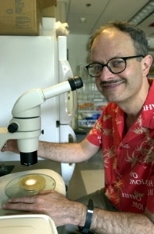CAMBRIDGE, Mass. -- In results that counter the idea that oxygen free radicals cause aging, an MIT researcher reports in the July 18 issue of Nature that calorie restriction prolongs life because it increases respiration, not because it decreases oxygen free radicals.
MIT biologist Leonard Guarente believes "the conventional wisdom on oxygen radicals is dead wrong. Our results (in yeast) are contrary to the frequent suggestion that calorie restriction functions by slowing metabolism and thereby slowing the generation of free radicals."
Guarente, who is working on a book on aging to be published this fall, discovered in 2000 that calorie restriction activates the silenced information regulator (SIR2) gene, which has the apparent ability to slow aging. This gene makes a protein called Sir2, which Guarente has shown is integrally tied to extending life span in yeast and in the roundworm. Humans carry a similar gene.
Rather than a slower metabolism leading to a slower rate of respiration, it turns out that respiration in yeast cells under calorie restriction goes up, not down. "The increase in anti-oxidant enzymes that is reported to occur during calorie restriction in animals may be a result of an increase in respiration rather than a cause of the observed longevity," Guarente said.
"A high respiration rate is intimately connected with calorie restriction in yeast," he said. "A high respiration rate activates SIR2. When respiration goes up, NAD (nicotinamide adenine dinucleotide, a co-enzyme that activates SIR2) goes up and SIR2 goes up. When SIR2 goes up, longevity happens."
A MIRACLE PILL
The prospect of a possible future drug seems too good to be true: Lose weight and live longer. Guarente's aim is just such a drug.
Calorie restriction extends life span in a wide spectrum of organisms. It is the only regimen known to lengthen the life span of mammals such as mice and rats. One conventional theory for why this works is that to conserve energy and live within the means of limited food intake, the organism's metabolism slows down.
Because a 30 percent reduction in calories is too difficult for most people to maintain, Guarente hopes to find the knowledge that would allow a pharmacological "trick" to make the organism think that it is calorie-restricted even when it is not. The hoped-for result is that this will trigger longevity.
DIVERTING ENERGY
When a yeast cell metabolizes food, the process can lead to respiration or fermentation, both of which supply the cell with energy.
When there is plenty of food available, yeast cells prefer to use food for fermentation. When food is scarce, the cell opts for respiration. Guarente found that this metabolic shift toward respiration increases SIR2's activity and thus life span, just as calorie restriction does.
In mammals, excess carbon is used to make fatty acids and store carbohydrates. If there is a way to mimic this metabolic shift in humans, it would mean that more food would be used for respiration and less would be stored as fat. The result? We could live longer and be thinner.
THE CULPRIT BEHIND AGING
Studies have suggested that calorie restriction slows aging primarily because it decreases oxygen free radicals. Oxygen free radicals are byproducts of oxidation, the body's process of turning oxygen into energy.
Free radicals are thought to be toxic, causing damage to DNA and cells. Although antioxidants "clean up" free radicals, this process becomes more inefficient as we age. Many scientists speculate that free radical damage is the primary culprit behind age-related diseases and the symptoms of aging.
Contrary to these previous findings, Guarente says in the current paper that oxygen free radicals do not limit the reproductive life span of yeast and are not central to the extension of life span by calorie restriction.
Co-authors for the paper are Su-Ju Lin, Matt Kaeberlein, Pierre-Antoine Defossez of the MIT Department of Biology; biology graduate student Alex A. Andalis and MIT Professor of Biology Gerald Fink of the Whitehead Institute for Biomedical Research and Lori A. Sturtz and Valerie C. Culotta of the Johns Hopkins School of Public Health.
This work is supported by the National Institutes of Health, the Ellison Medical Foundation, the Seaver Institute and the Howard and Linda Stern Fund.






